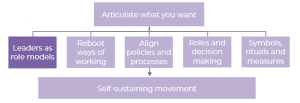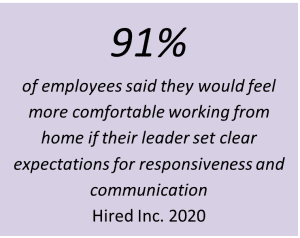
3) Creating leaders as role models
Our recent articles have been guiding you through how to create a deliberate culture in a hybrid world.
Last time we focused on how to articulate what the organisation wants and needs, preserving and evolving the current culture as necessary. For example, becoming (or remaining)
- More agile
- More customer-focused
- More collaborative
- More empowered
- More inclusive
The recent crisis has done two things for many organisations – made the imperative for sustained culture change even more urgent and shown the art of the possible when everyone unites around a small number of priorities.
So, what does this teach us about culture change? Especially when making it happen in a hybrid world.

In our experience, once a clear vision of the future culture has been described, the next step is to create a powerful movement of advocates, with a shared interpretation of this future, a common narrative to bring it to life and a strong desire to make it a reality.
Repeated research shows that 80% of a team or organisation’s culture is determined by the leaders. So, leaders need to deliberately and visibly role model the future culture in their day-to-day decisions, priorities, behaviours and tone.
How do they do this in a hybrid world, where they are far less visible day-to-day?
Leaders need to really think through what and how their role-modelling will cut through the blurred boundaries most people now have between home and work. They need to create a strong incentive for people to bring a fresh mindset or new behaviours to work. They need to make change easy to grasp and personally meaningful.
Take ‘empowerment’ as an example. This is a cultural shift many workplaces have been trying to achieve for years; now it has become an essential ingredient of remote-working and will remain so in a future hybrid world of work. But managers who have been ‘top-down’, checking up on tasks and assuming presenteeism equals performance for many years find this a difficult shift to make. Old habits and old thinking die hard.

The reverse is also true. When teams are used to their managers solving all of the problems it takes more than one conversation for habits to change, for people to feel responsible for finding solutions and innovating themselves.
5 Tips for leaders to role model future culture
- Keep it simple – create space for leaders to agree the one or two specific shifts towards the future culture that they want to bring about in the next 3 months. For example, “we’re going to become trust-builders and lead by outcome, not activity”.
- Hold up the mirror – help leaders get honest feedback on how they’re doing already with this behaviour – strengths to build on and blind spots to address. 360 feedback is a helpful tool, or simply ask their teams and peers – How do I do this well? How can I do this better?

- Make it day-to-day – although the nature of our time together has changed, we do still spend time in meetings or on calls. Ask yourself How will I role model this mindset/behaviour shift in my conversations this week? What impact do I expect it to have? How will I know it’s working?
- Be creative – with most people feeling Zoom-fatigue, use fresh ways to communicate, inspire and engage colleagues such as podcasts or WhatsApp video messages.
- Create a movement – give your existing change ambassadors opportunities to be more vocal and more influential. Give responsibility to people still ‘on the fence’ to turn them into positive influencers. Involve them as new voices, telling stories that build confidence and motivation to do things in the new way.
Get in touch
To discuss how to engage everyone in your chosen future of work and build your distinctive culture call us on 01208 824 508 or at [email protected]
Follow us
Don’t miss out on the upcoming articles, follow us at https://www.linkedin.com/company/pecan-partnership
